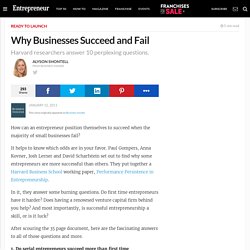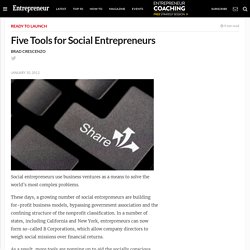

JulianBC
Resource # 11. Resources # 10. Resources # 9. Resources # 8. Resources #7. Resources #6. Resources #5. Resources #4. Resources #3. How Adversity Leads to Success. We're searching for top company cultures to be featured on our annual list.

Think your company has what it takes? Apply Now » One of the biggest problems I see among the entrepreneurial crowd, especially the younger generation, is their overwhelming obsession for whatever feels good. Ironically, that’s exactly the opposite of what creates successful businesses and leaders. How you handle adversity, challenge, and competition plays an enormous role in determining how things turn out for you in life. This is nothing new. Here’s a great example. Related: Want to Be Successful? I often watch them protect their territory in aerial dogfights with invading black crows. The prevalence of these raptors all across North America is largely a result of how well the species has adapted to adversity, challenge, and competition in its ecosystem. Red-tail hawks haven’t just survived adverse conditions; they’ve thrived in them.
Softbank’s Masayoshi Son – the richest man in Japan – comes to mind. The 7 Traits of Successful Entrepreneurs. This story appears in the January 2014 issue of Entrepreneur.

Subscribe » Enter "entrepreneurial traits" into Google, and the menu of frequent searches will complete the query with "... of Steve Jobs" and "... of Bill Gates," among others. These are the forces of nature that spring to mind for most of us when we think of entrepreneurs--iconic figures who seemed to burst from the womb with enterprise in their DNA. They inspire, but they also intimidate. What if you weren't born with Jobs' creative genius or Gates' iron will? Contrary to conventional wisdom, you don't have to be Type A--that is, an overachieving, hyperorganized workaholic--or an extrovert to launch a successful business.
However, the best entrepreneurs do share a collection of characteristics, from tenacity to the ability to tolerate risk, that are crucial to a successful venture. Tenacity. 10 Best Reasons to Be an Entrepreneur. I recently asked fellow members of the Young Entrepreneur Council--an invite-only organization made up of the world's most successful young entrepreneurs--just what it is that makes them work so hard.

Money? Success? Autonomy? Or do entrepreneurs just have big egos? Being an entrepreneur myself, I wanted to know why others work with such persistence and dedication. Not one of the entrepreneurs I spoke to mentioned money as the motivator. Surprised? So what are entrepreneurs driven by, if not money? 1. Susan Strayer Lamotte, a leader in talent acquisition and HR, says she's motivated simply by "doing great work. 2. Some entrepreneurs simply want to avoid the daily grind that comes along with a career that isn't self-sustaining. How to Become a Truly Successful Entrepreneur. Why Businesses Succeed and Fail. How can an entrepreneur position themselves to succeed when the majority of small businesses fail?

It helps to know which odds are in your favor. Paul Gompers, Anna Kovner, Josh Lerner and David Scharfstein set out to find why some entrepreneurs are more successful than others. They put together a Harvard Business School working paper, Performance Persistence in Entrepreneurship. In it, they answer some burning questions. Do first time entrepreneurs have it harder? After scouring the 35 page document, here are the fascinating answers to all of those questions and more. 1. If you're a first time entrepreneur, outlook not so good. According to the Harvard researchers, there is performance persistence in entrepreneurship. They write, "All else equal, a venture-capital-backed entrepreneur who succeeds in a venture (by our definition, starts a company that goes public) has a 30 percent chance of succeeding in his next venture.
Managing Time. As a business owner you know how important time is.

You get sucked into so many things that you don’t want to be doing and at the end of it you’re left with frustrations at the idea of all the things you could have achieved instead of replying to emails, dealing with complaints or answering unnecessary calls. But we’re here to tell you it all gets better. It’s a learning curve. There’s just too many options out there for you to keep hitting your head on time’s wall. Five Tools for Social Entrepreneurs. Social entrepreneurs use business ventures as a means to solve the world’s most complex problems.

These days, a growing number of social entrepreneurs are building for-profit business models, bypassing government association and the confining structure of the nonprofit classification. In a number of states, including California and New York, entrepreneurs can now form so-called B Corporations, which allow company directors to weigh social missions over financial returns. As a result, more tools are popping up to aid the socially conscious business owner.
Here are five resources designed to help do-good entrepreneurs get their enterprises off the ground and into the black. Related: CharityBuzz's Big Idea: Altruistic Online Auctions.